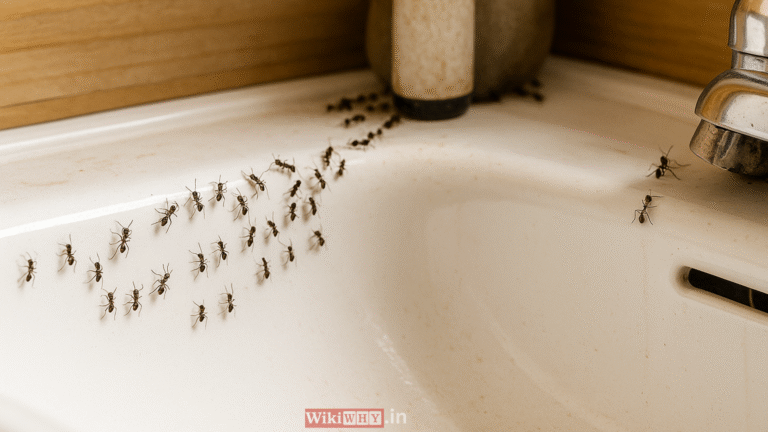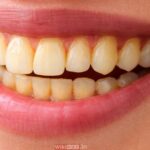When you enter your bathroom and see a trail of small ants marching around the sink or bathtub, the initial reaction that comes to mind is confusion & question Why are ants in my bathroom?
The sight can be both frustrating and shocking, given the fact that most of us find ants in kitchens, food spills, or gardens. But there are definite scientific, environmental, and even cultural explanations for this frequent occurrence.
In this article, we’ll delve into the actual scientific causes of ants invading bathrooms, discover secret habits that draw them in, and even briefly address some of the myths and religious misconceptions that people have about ants being in the home.
In conclusion, not only will you know why ants are in your bathroom, but you’ll also learn how to keep them out in the best way.
Scientific Causes of Ants Invading Bathrooms
According to federal and industry pest management studies, ants consistently rank among the most frequent indoor invaders.
The U.S. Department of Agriculture (USDA) , through its Integrated Pest Management program , identifies ants as the most common pests found indoors, particularly in areas that offer food, water, and shelter.
Moreover, a national survey from the National Pest Management Association (NPMA) found that ants infested nearly 90% of bathrooms, matching kitchen infestation rates PestWorld.
Notably, the results also emphasize that Food and the consistent presence of water sources attracted ants. Hence, bathrooms are one of the entry points for ants.
Just like ants, flying termites also appear suddenly when environmental factors such as temperature and humidity create ideal conditions for their swarming.
Ants are social insects, and they survive based on the discovery of food, water, and secure nesting areas. Bathrooms, surprisingly, offer all three on some occasions. Let’s analyze the major reasons:
1. Attraction to Moisture
Moisture attracts ants. Bathrooms typically feature running faucets, wet floors, or damp towels, which create the perfect microclimate for ants.
Carpenter ants and odorous house ants actively seek wet environments. Moreover, their survival depends on constant access to moisture.
Moreover, the humid bathroom environment keeps the ants constantly hydrated, especially during the summer when other sources of water may be scarce.
2. Scent Trails from Toiletries
While you do not count toothpaste, soap, or shampoo as food, ants are highly attuned to chemicals with a sugar content. Certain toothpastes, for example, contain sweet-tasting glycerin or sorbitol, which will attract ants. Moreover, the smell of perfumed soaps or lotions also attracts ants.
3. Foraging for Food Residue
You don’t even know it, but the bathroom is an unexpected culprit when it comes to food residue. Ants feed on dead skin, hair, or even tiny traces of sweet mouthwash. Invisible to human eyes, ants are capable of sensing the smallest amount of organic substances.
4. Bathroom Access Points
Bathrooms often have tiny cracks, ventilation tubes, drains, and windows. As a result, ants easily find access points to enter the space. Compared to kitchens, which may have relatively secured doors and cabinets, bathrooms typically have breaches under pipes and around tiles that are readily exploited by ants.
5. Nesting Opportunities
Some ants, especially carpenter ants, are not just visitors but may also build colonies within moist wooden structures around bathrooms. Wooden door frames, window sills, or cabinets exposed to humidity are perfect spots for ants to nest.
Myths and Religious Beliefs About Ants in Bathrooms
Ants have fascinated humans for centuries, and their sudden appearance indoors has often been linked with myths, symbolism, and religious interpretations.
1. Hindu Beliefs
In Hinduism, ants are sometimes seen as a sign of prosperity or incoming guests. However, their appearance in unusual places like bathrooms is often thought to indicate a warning about cleanliness. Since purity and hygiene are emphasized in Hindu rituals, ants in the bathroom may be interpreted as a signal to improve domestic cleanliness.
2. Christian and Biblical Symbolism
In the Bible, ants symbolize hard work and diligence. However, many Christian households associate ants in the bathroom with a lack of household discipline or negligence. The lesson drawn is that maintaining order and cleanliness keeps both pests and spiritual disorder away.
3. Islamic Interpretations
In Islam, ants are considered creatures of Allah, and their sudden presence is not dismissed lightly. Some people interpret their appearance in bathrooms as a reminder to maintain hygiene and avoid waste of water. Since the bathroom is a place of purification, ants here may symbolize the need for more mindfulness.
4. Cultural Myths Worldwide
In some African traditions, ants in unusual places are thought to be messengers of change.
In Chinese culture, ants are sometimes associated with family unity and cooperation. Their presence indoors, however, is seen as a reminder to maintain balance in the household.
Common Species of Ants Found in Bathrooms
Not all ants behave the same way. The species in your bathroom can reveal a lot about the reason they are there.
- Odorous House Ants: Attracted to moisture and sugary residues.
- Carpenter Ants: Look for damp wood to build nests.
- Pharaoh Ants: Thrive in warm, humid places like bathrooms.
- Pavement Ants: Enter through cracks and are attracted to organic matter.
Why Ants Swarm in Bathrooms After Rain
Have you noticed more ants in your bathroom after rainfall? Rain often floods underground nests, forcing ants to look for dry shelter. Bathrooms provide both shelter and water access, making them an ideal temporary refuge.
Do Ants in the Bathroom Indicate Poor Hygiene?
Not always. While poor hygiene can certainly attract ants faster, even the cleanest bathrooms may face infestations due to structural cracks, seasonal changes, or weather-related ant behavior.
However, ignoring them may lead to a growing infestation that can damage wooden structures, spread germs, and create discomfort.
How to Get Rid of Ants in Bathrooms
Now that we know why ants are in your bathroom, the next step is eliminating them effectively.
1. Fix Moisture Issues
Repair leaking faucets, seal pipe gaps, and keep surfaces dry. Ants will leave if water becomes less accessible.
2. Clean Regularly
Scrub sinks, floors, and drains to remove organic residue. Avoid leaving wet towels or clothes in the bathroom.
3. Seal Entry Points
Check cracks, tiles, and window edges. Use caulk or sealants to close their access points.
4. Use Natural Repellents
- Vinegar spray breaks their scent trails.
- Lemon juice repels ants with its acidic nature.
- Essential oils like peppermint or tea tree can keep ants away.
5. Chemical Solutions
If the infestation is large, use ant baits or insecticidal sprays specifically designed for indoor use.
Long-Term Prevention Tips
- Maintain ventilation to reduce humidity.
- Keep drains unclogged and disinfected.
- Inspect wooden bathroom furniture for dampness.
- Schedule seasonal pest inspections for long-term control.
Conclusion
So, why are there ants in my bathroom? The answer is both simple and complex. Scientifically, ants are drawn to moisture, hidden food sources, and structural entry points.
Spiritually and culturally, their appearance has been interpreted in various ways, from warnings about cleanliness to symbols of prosperity or change.
By understanding both the science and the myths, we can approach this issue calmly and take preventive measures.
The key lies in maintaining cleanliness, reducing moisture, and blocking entry points. With a little effort, you can ensure that your bathroom remains ant-free, hygienic, and peaceful.
Frequently Asked Questions (FAQs)
Q1. Why do ants suddenly appear in bathrooms?
Most ants appear because bathrooms provide moisture, food traces, and easy entry points.
Q2. Are ants in bathrooms dangerous?
Most ants are not harmful, but they can spread bacteria and damage wood.
Q3. Do ants in bathrooms mean poor hygiene?
Not necessarily. Even clean bathrooms can attract ants due to cracks, leaks, or humidity.
Q4. Can religious beliefs about ants be true?
Religious or cultural beliefs reflect symbolic meanings, while science explains their actual behavior.
Q5. How do I permanently get rid of ants in my bathroom?
Fix leaks, clean surfaces, seal cracks, and use natural or chemical repellents if needed.















1 thought on “Ants in the Bathroom: Why They Appear & How to Stop Them”